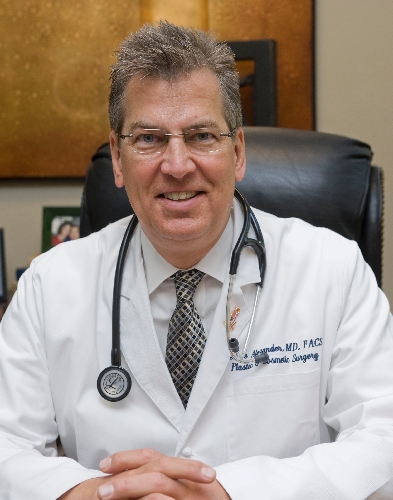DIAGNOSIS LAS VEGAS: Dr. George Alexander

What is the biggest misconception about medical care in Las Vegas?
The biggest misconception about medical care in Las Vegas is that it is better elsewhere. The Las Vegas medical community includes physicians who are renowned in their field, highly trained nurses and hospitals that provide some of the highest-quality care in the United States. Our doctors and hospitals use the most advanced and sophisticated technology available.
In the plastic surgery field, my peers are among the best the U.S. has to offer, with outstanding educational pedigrees. They provide exceptional results. And, because of this reputation for excellence, many patients travel to Las Vegas to have access to our level of plastic surgical excellence. In addition to drawing patients from around the U.S., we draw a great number of international patients.
If you could change one thing about health care in Las Vegas, what would it be?
Our image. I would like to see our medical community’s reputation reflect the outstanding quality of service that we have to offer. I have lived in Las Vegas for 17 years and have experienced both as a health care provider and recipient of health care how quality-focused our medical care is.
Unfortunately, some rare but major problems in health care arose and have been identified. Those issues have been looked at under the microscope and they have been addressed and changes made so that they do not recur.
You will see new advancements as our local quality excels. This includes our partnerships with some of the best health care in the world as they associate with our community, examples that include the Cleveland Clinic, Stanford University and University of California, San Diego.
Las Vegas is often regarded as an unhealthy city. Is that a fair assessment?
I do not feel that’s a fair assessment, though it is many people’s perception, which is due in part to the lifestyle that exists to attract tourists. Like most physicians, I see healthy and unhealthy patients in my practice. However, the vast majority of our patients are in the best of health. For example, we have many patients in the entertainment and hotel/service industries, and they are healthy and maintain a high level of fitness. Most follow a healthy diet and do not smoke.
Still, we do have a population that’s challenged — those who are inactive, eat too much and smoke. If people are in good health, they will enjoy optimal results in plastic surgery. For that reason, we have to advise them to first improve their lifestyle and health prior to any elective plastic surgery.
I feel as a community, we could do more to encourage our population to lead a healthy, active lifestyle — a message that’s much different than what we communicate to our tourists. It’s a matter of education and helping them to understand that being in better health can begin with simple lifestyle changes.
What is the biggest challenge facing the medical community in 2012?
The majority of elective plastic surgery is performed on patients that have excess expendable income. So in my field the biggest challenge we face is the economy. The recession has had a huge impact on our community and people have to make choices as their expendable income shrinks. This has been an issue that has affected plastic surgeons locally as well as nationally.
Fortunately, the quality plastic surgeons have weathered the storm and are just now seeing sunshine peek through the clouds. No one has a crystal ball to predict the future, but as a community we have always adapted and have been able to overcome. I anticipate guarded optimism for 2012.












